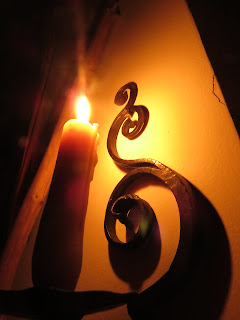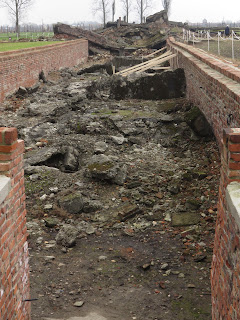My Path to Bearing Witness at Auschwitz (Part 1)
The first time I thought with much intention about the concept of "bearing witness" was when I read Trebbe Johnson's article "Gaze Even Here" as published in Orion Magazine. She speaks of bearing witness to clear cuts in the Canadian wilderness--of spending days in those desecrated places and, in fact, gazing into them like one would gaze into the face of a lover. Johnson admits "aversion is a natural response to bearing witness to something tragic." This is the reality that when tragedy strikes within our range of witness, many of us will perhaps look and be outraged or heartbroken for a moment, a day, a week, but after a while of driving passed the same clear-cut, the same strip-mall that was once an eco-system, the same prison where people are trapped and tortured, it is admittedly difficult to sustain the gaze, at least with same ferocity we did initially.
 In noticing her own aversion to environmental degradation, especially as someone who cared deeply about the health of the natural world, Johnson wondered what it would be like to get closer to the devastation, instead of distancing and looking away. She decided to spend several nights camping in a clear cut, "deliberately seeking out a damaged place" the way many of us deliberately seek out for a "pristine" "undamaged" wilderness. (I put those word in quotes because I am not quite sure if there is such a thing. I tend to think of it more as a spectrum between healthy functioning and diverse eco-systems and deadened, cleared, paved-over landscapes). Typically the images and locales that are sought out and cherished are those which industrial society has touched the least. When I go out backpacking, I drive passed the clear-cuts cringing, in order to get to the soul-solace of the protected forests.
In noticing her own aversion to environmental degradation, especially as someone who cared deeply about the health of the natural world, Johnson wondered what it would be like to get closer to the devastation, instead of distancing and looking away. She decided to spend several nights camping in a clear cut, "deliberately seeking out a damaged place" the way many of us deliberately seek out for a "pristine" "undamaged" wilderness. (I put those word in quotes because I am not quite sure if there is such a thing. I tend to think of it more as a spectrum between healthy functioning and diverse eco-systems and deadened, cleared, paved-over landscapes). Typically the images and locales that are sought out and cherished are those which industrial society has touched the least. When I go out backpacking, I drive passed the clear-cuts cringing, in order to get to the soul-solace of the protected forests. What Johnson found venturing into the clear-cuts rather than passing them by was quite striking to me: "We discovered that what we had feared would be too painful to bear was not. Gradually, by practicing the art of gazing, we got to know this broken forest. And then, so slowly we hardly recognized what was happening, we began to love the place. There is no other way to say this. Willingness to look turned into curiosity, which turned into acceptance, which turned into compassion, and that turned into love. By the end of the week, none of us wanted to leave."
~~
When I learned about the Annual Bearing Witness Retreat at Auschwitz, Trebbe's article and revelation was far from my (conscious) mind. But Holocaust imagery and story lines had been permeating my dream landscape for years, particularly being in or around concentration camps or brick and concrete buildings that have a distinct feeling of death and terror. I believe the dreams started around the time I first visited the Holocaust Museum in DC in 2011. Of course I had learned about the Holocaust in school and at home, but it was at the museum where I truly encountered the Holocaust. Seeing photographs of victims and videos of people being shot, walking past an enormous pile of shoes that was found in a death camp, and seeing walls upon walls of names and pictures of people whose lives were taken from them forced me to open to a fuller reality of it.
What took me to the museum was leading a high school group with the National Youth Science Camp. After our slow walk through the that horrific history the young folks were ready to go straight to the Natural History Museum. We headed over there hopefully, but when we walked up the staircase and into the lobby I realized I was completely shut down to being there--I can't even remember what I saw. As much as the more-than-human world has been a balm for me in the face of human indecency, the wonders of nature couldn't permeate through the new layer of cold concrete that had been set over my heart. I told the group to stay together and that I'd be outside if they needed me. I walked back into the humid sun, which melted me into a pool of tears right there on the museum's stairs.
~~
I must have sat on those steps for an hour or more sobbing and sweating and snotting into my hands. Hundreds of people walked by me--camp friends and strangers alike. No one stopped. Again, as Trebbe says, "aversion is a natural response to bearing witness to something tragic." It was hard, but the important thing to me was that I wasn't looking away anymore. I couldn't. Those images, words, names, faces, were carved into my mind. I couldn't just walk through that museum and get on with my life. I was permanently altered.
I called my dad in anguish, begging fruitlessly for an explanation, an answer, something to make it all make sense. Nothing he could say helped, though he tried valiantly. Finally, a woman wearing pink came up to me holding out a pink bottle of water. As she handed me the bottle she said "I am running that booth down there and noticed that you've been crying up here for a long time. Are you okay? Do you need anything?" I thanked her and told her I would come talk with her when I was off the phone.
The one thing my dad shared that stuck with me, as my whole being was railing against humanity, was about our family. He told me about my great grandfathers siblings who were were still in Eastern Europe when the Germans invaded. They fought in the underground partisan resistance against the Nazis. My great grandfather and his sister had left before the war otherwise I would probably not be here today--those who stayed behind all died. But they died fighting for their people, as the story goes. I knew my dad was trying to tell me there are good people who will fight for what's right; that humanity isn't all evil. I filed it away as something to think about but nothing could do much to thicken my faith in people that day--the day I found out just how many refugees the United States had turned away and sent back to their deaths, the day I watched real human lives end in an instant in a video the Nazis took of an execution, the day I realized how truly recently this had all happened.
After the phone call I went down to the pink lady and I found that she was running a PeTA booth. The pictures of caged, tortured, and dying animals were mirror images of what I had just seen in the museum, and there was even a quote about animal cruelty from a Holocaust survivor. Maybe some people have a higher tolerance for looking into the face of darkness, I thought. This woman who sat with these images all day, inviting people to face these realities and refusing herself to look away--she had been the only one to gaze upon my desolation long enough to be moved to do something. It was her willingness to bear witness to me and to these other horrors that cracked the concrete wall that had built around my heart.
~~~
When I think of the Holocaust now, I think of how there are refugee crises the world over and the United States government is still turning people away, sending them back to instability and probably death; is still deporting people who already live in this country; is still funding, arming, and enacting genocide in countries all over the world; and, furthermore, is still choking out the resource base of the people who were living here long before the United States was even an idea. In the face of this reality, part of me is still sitting on those steps begging my dad, the universe, God herself even, for answers that would make sense of unbelievable daily atrocity. Part of me is exhausted of hearing of to the onslaught of death and pain and disaster that happens at the hands of fellow humans every day, or to know my complicity in it. And yet, part of me is still unwilling to look away.
For more information on my trip, my intentions, my story, and how you can support me, please check out this link: https://www.gofundme.com/alexsbearingwitnessretreat




"Refusing to look away " ..... As the Dad who didn't have the answers for you, as you sat crying on those steps, I am so moved by your courage and commitment to not look away, to bear witness, to be as little of the problem as one can be, and to be part of the solution. I am thankful for your gracious forgiveness of my inadequacy. We face a world of too much selfishness, too many decisions not to bear witness, too many instances of looking straight through and not seeing, or looking away, denying what we do perceive and choosing to suppress it. It is too easy to self anesthetize, to deny, to rationalize, to pretend the future will be okay if we do not own it, if we do not take personal responsibility, if we do not act. I wish I had known enough, before you taught me, to have said to your tears, "bear witness, grieve, grieve and grieve more, then then choose action, and write, write, write, write using your profound gift..... " You have taught me what is required to be a better Dad.... and a better person.... thank you, Dad
ReplyDelete